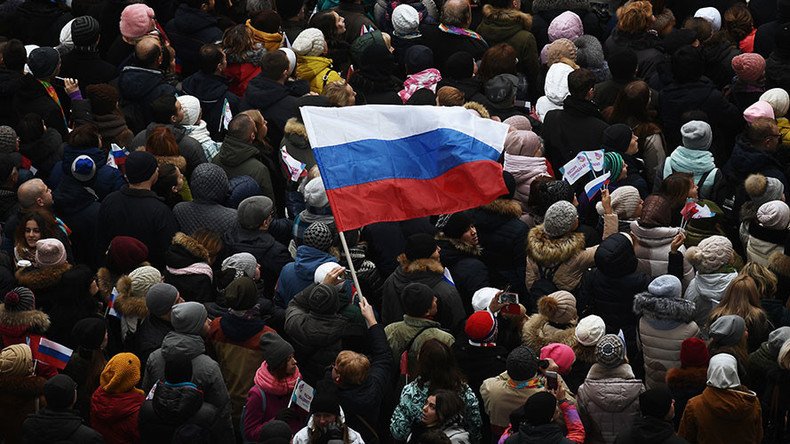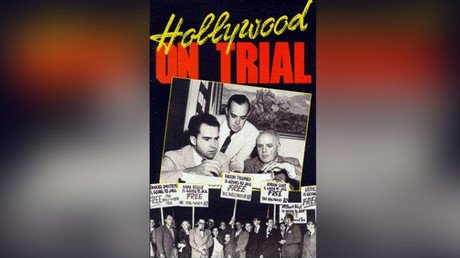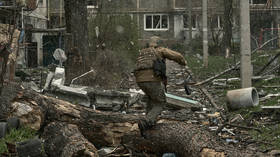This week in Russophobia

Russophobia: an intense and often irrational hatred for Russia (Collins English Dictionary)
For the past few years, this unfortunate condition has been on the rise again on both sides of the Atlantic, reaching levels last seen during Joseph McCarthy’s heyday, back in the 1950s. Of course, the advent of social media has made it easier for sufferers to transmit the virus. Welcome to an occasional series, “This Week in Russophobia,” where we will keep you abreast of the latest flame-ups.
If wishing made it so…
In an attempt to attack Little Englander Nigel Farage, The Guardian’s supersleuth Carole Cadwalldr wrote that RT "was banned last week from Twitter.” But RT was never banned by Twitter, only RT advertising was (on a totally absurd premise). Props for eventual correction, but can we keep the screenshots in the “fake news” file?
A beast with… never mind
Katerina Kruk works for the George Soros-backed “European Values,” a Prague-based pressure group that recently confused Larry King and Larry David in a big report on RT. Kruk came to prominence as a social media cheerleader for Ukraine’s 2014 Maidan coup.
This week she tweeted, in response to the death of a Chechen militant near Kiev: "a strong woman, unapologetic critic Putin." Of course, there is absolutely no evidence to suggest the deceased was assassinated on Moscow’s orders, but who needs evidence when you can cry “Moscow”!
One man’s corruption is another man’s hybrid war
When Interior Minister Arsen Avakov’s son was detained as part of a corruption probe, it was no surprise Moscow was pointed to, because everyone knows the idea of a Ukrainian politician’s family engaging in corruption is totally absurd. Especially given how Kiev’s public servants are noted for their probity and financial restraint :-|
Having released a detailed official statement, the ministry suggested that "certain foreign forces" are behind the troubles of the Ukrainian interior minister and his family members. A "hybrid war" is led against Kiev's reformers, the official body alleged, explaining that "fake news" targeted Arsen Avakov and his ministry’s efforts "to protect the state against Russian hybrid aggression." The “blame Russia” game seems never out of fashion in Ukraine.
Lie back and think of the Kremlin
Sexual misconduct is a terrible thing and we should take reports of such seriously… OR should we exploit them for political purposes? That whiff of exploitation came from the Guardian’s Martin Kettle as he inexplicably attempted to bring Russia into the sex scandal engulfing British Conservative MPs, tweeting“If I worked for Putin, I'd think that Tory spreadsheet was a good day's work.”
Professor Godfrey Bloom, a former member of the European Union parliament, chimed in, adding that Putin was also behind Brexit. This will surely be news to the 17.4 million Brits who voted to leave the EU.
War of the words
Mark Galeotti is what’s known as a “Russia watcher,” part of a group of mainstream pundits who usually do not live in Russia but pontificate on all aspects of life there. In the most-Guardian headline ever, Galeotti proclaims that “Putin could yet save Britain from Brexit. […] The word of Russian ‘black cash’ financing the Leave campaigns is fast becoming a torrent. As the inquiries pile up, hard evidence could delegitimize the EU referendum.” Hmmm, yes.
While we’re waiting for said “hard evidence,” Galeotti fails to mention a large power that definitely interfered in Brexit, and one that the Guardian is a fan of! Former US President Barack Obama literally flew to England to tell people how to vote in their referendum. A move the Guardian described as “friendly.” Hmmm again.
On the flip side, as the Twitter thread from journalist Mike Hind outlines: “the foreign dark money for Brexit was American. Mark my words.”
The statements, views and opinions expressed in this column are solely those of the author and do not necessarily represent those of RT.
















